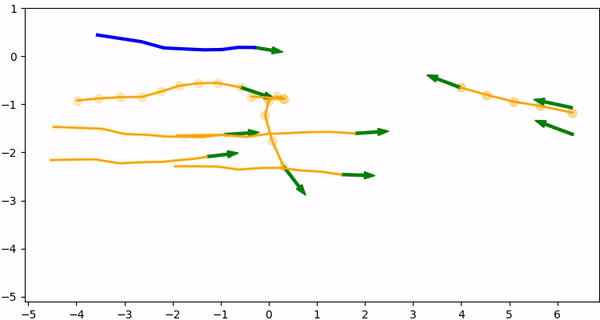PyTorch implementation of Human Trajectory Forecasting in Crowds: A Deep Learning Perspective
TrajNet++ is a large scale interaction-centric trajectory forecasting benchmark comprising explicit agent-agent scenarios. Our framework provides proper indexing of trajectories by defining a hierarchy of trajectory categorization. In addition, we provide an extensive evaluation system to test the gathered methods for a fair comparison. In our evaluation, we go beyond the standard distance-based metrics and introduce novel metrics that measure the capability of a model to emulate pedestrian behavior in crowds. Finally, we provide code implementations of > 10 popular human trajectory forecasting baselines.
The detailed step-by-step procedure for setting up the TrajNet++ framework can be found here
To convert external datasets into the TrajNet++ framework, refer to this guide
The training script and its help menu:
python -m trajnetbaselines.lstm.trainer --help
Run Example
## Our Proposed D-LSTM python -m trajnetbaselines.lstm.trainer --type directional --augment ## Social LSTM python -m trajnetbaselines.lstm.trainer --type social --augment --n 16 --embedding_arch two_layer --layer_dims 1024
The training script and its help menu:
python -m trajnetbaselines.sgan.trainer --help
Run Example
## Social GAN (L2 Loss + Adversarial Loss) python -m trajnetbaselines.sgan.trainer --type directional --augment ## Social GAN (Variety Loss only) python -m trajnetbaselines.sgan.trainer --type directional --augment --d_steps 0 --k 3
The evaluation script and its help menu: python -m evaluator.lstm.trajnet_evaluator --help
Run Example
## LSTM (saves model predictions. Useful for submission to TrajNet++ benchmark) python -m evaluator.lstm.trajnet_evaluator --output OUTPUT_BLOCK/trajdata/lstm_directional_None.pkl --path <path_to_test_file> ## SGAN (saves model predictions. Useful for submission to TrajNet++ benchmark) python -m evaluator.sgan.trajnet_evaluator --output OUTPUT_BLOCK/trajdata/sgan_directional_None.pkl --path <path_to_test_file>
More details regarding TrajNet++ evaluator are provided here
Evaluation on datasplits is based on the following categorization
Unimodal Comparison of interaction encoder designs on interacting trajectories of TrajNet++ real world dataset. Errors reported are ADE / FDE in meters, collisions in mean % (std. dev. %) across 5 independent runs. Our goal is to reduce collisions in model predictions without compromising distance-based metrics.
| Method | ADE/FDE | Collisions |
| LSTM | 0.60/1.30 | 13.6 (0.2) |
| S-LSTM | 0.53/1.14 | 6.7 (0.2) |
| S-Attn | 0.56/1.21 | 9.0 (0.3) |
| S-GAN | 0.64/1.40 | 6.9 (0.5) |
| D-LSTM (ours) | 0.56/1.22 | 5.4 (0.3) |
Code implementation for explaining trajectory forecasting models using LRP can be found here
We host the Trajnet++ Challenge on AICrowd allowing researchers to objectively evaluate and benchmark trajectory forecasting models on interaction-centric data. We rely on the spirit of crowdsourcing, and encourage researchers to submit their sequences to our benchmark, so the quality of trajectory forecasting models can keep increasing in tackling more challenging scenarios.
If you find this code useful in your research then please cite
@article{Kothari2020HumanTF,
author={Kothari, Parth and Kreiss, Sven and Alahi, Alexandre},
journal={IEEE Transactions on Intelligent Transportation Systems},
title={Human Trajectory Forecasting in Crowds: A Deep Learning Perspective},
year={2021},
volume={},
number={},
pages={1-15},
doi={10.1109/TITS.2021.3069362}
}

